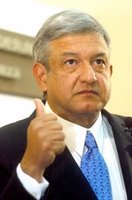Strong democracy vs. Strongman democracy in Mexico

Events have heated up considerably in Mexico concerning the disputed presidential election. Last week, the Federal Election Tribunal ruled that there had been little evidence of fraud in the election as claimed by Andres Manuel Lopez Obrador (AMLO). This clears the way for the Tribunal to declare Calderon the president elect, probably later this week. AMLO has already said he considers the possbile Calderon admistration to be illegitimate and is calling for a grassroots gathering on September 16 (Mexican Independence Day) in Mexico City. Many are worried that AMLO is going to declare a "government-in-exile" that could destabilize the country.
Mexican intellectual Enrique Krauze lays out the worry that Mexico's fragile democracy is under threat . His position is very similar to the idea that Victor and I explored in our podcast on democracy in the Americas in July. Krauze points out that Mexico has only had a tradition and practice of democratic rule for less 25 years in its hundreds of years as a society. He worries that putting too much pressure on it will cause it to collapse and bring about the Latin American tradition of caudillo, or strongman, government. The aspect that Krauze does not consider, which was brought up in our podcast, is that the destabilizing pressure on Mexican democracy is not coming from the grassroots, but from neo liberal economic policies that fuel globalization. Calderon represents many of the corporations and businesses that benefit from trade agreements, such as NAFTA, and is likely to continue this form of economic development. AMLO's support comes mostly from the poorer classes and among indigenous groups in the south. Journalist John Ross anticipates a class war to brew now with the Tribunal's decision .
Finally, a piece that suggests that the strength of democracy is something we need continually to uphold and nurture. There is a long tradition in the United States, going back to some of the founders, such as John Jay, and up to the present day in figures such as Richard Nixon, that distrusts the ability of common, ordinary people to have a say in democratic decision making processes. Has the war on terror created rules, procedures, expectations, and institutions that further this strongman view of government and eclipse strong democracy by the people? Perhaps the struggles in the streets of Mexico City are not really all that different from the struggles that are taking place in the United States in trying to define the meaning of democracy for the twenty-first century.
Labels: latin america


0 Comments:
Post a Comment
Subscribe to Post Comments [Atom]
<< Home